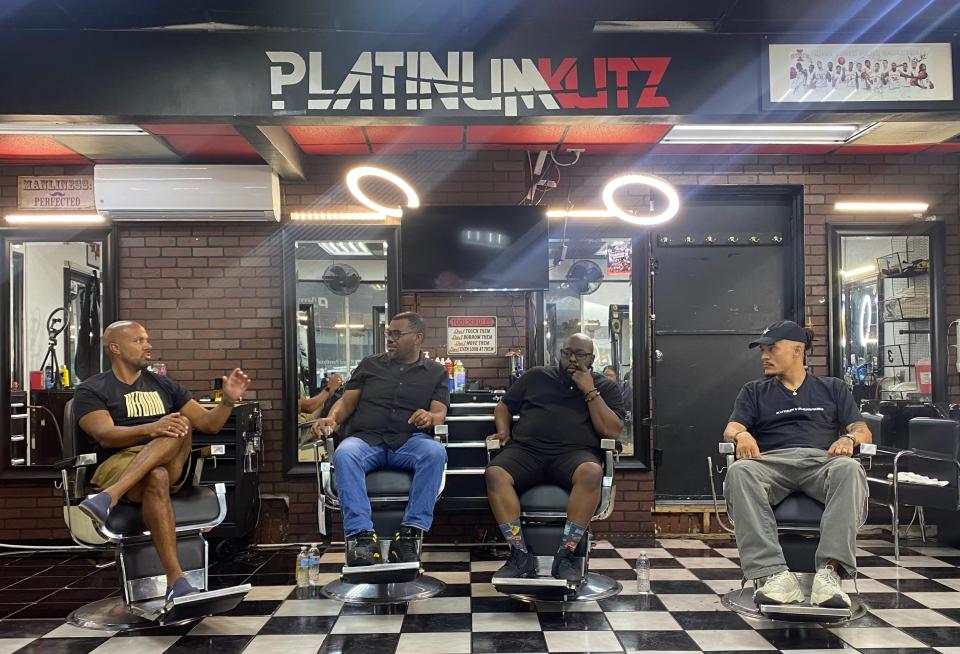Des Moines leaders open up about Black fatherhood, advocacy and turning their lives around
Thirty-five-year-old Rob Johnson still remembers the first time he said he was racially profiled by police. He was in fourth grade — and running late for school.
Seated in a barber chair, Johnson told a small crowd Monday night at Platinum Kutz barbershop in the Drake neighborhood that his school was right across the street from the affordable housing complex where he and his family lived. Johnson, a pastor and community activist featured on a three-member panel, said he was just trying to beat the school bell, sprinting as fast as he could to get to class — only to get stopped by officers on school grounds.
By the time Johnson reached the school parking lot, he said he saw three police cars pull in. With their guns drawn, the officers stepped out from their vehicles, demanding the young and confused Johnson get down on the ground and put his hands up.

"I was thinking to myself: 'What is happening right now?,'" he said to a quiet, still audience, which included his three nephews. "All of a sudden, they come up on me, throw me down to the ground and take my cellphone out of my hand. (One officer) turns to the other and says, 'Oh, it's just a cellphone.'"
That moment changed Johnson's life. Now, as an advocate, pastor and leader, he said he works to make sure that Black boys and men don't get "hunted down" like he was.
More: Starts Right Here founder Will Keeps, students open up about struggles, success after shooting
'I just want our boys to be OK'
Johnson's experience was among those shared during a nearly two-hour panel event hosted by Reform Alliance, a nonprofit focused on changing probation and parole laws in the U.S. The organization founded by Philadelphia rapper Meek Mill and backed by celebrities, including hip-hop mogul Jay Z, has helped pass more than a dozen pieces of legislation in 10 states, according to a news release.
Reform also has partnered with Iowa United for Opportunity, a coalition that recently endorsed House File 349, which seeks to create a more "incentivized" probation program, offering credits for employment and academic achievement, said Kam Middlebrooks, a Reform organizer.
Reform in February held a free job fair for formerly incarcerated Iowans, and the event at Platinum Kutz was just another extension of the nonprofit's work, CEO Robert Rooks said. Crucial, honest conversations take place in barbershops every day, he said.
In barber chairs, surrounded by bright ring lights, Rooks led the conversation, asking Johnson, state Sen. Izaah Knox and renowned artist Robert Moore to open up about their childhood, fatherhood and careers. Their personal experiences — especially around being a Black father — guided the discussion, offering insight into their relationships with themselves, their families, their communities and their work.
More: Kim Kardashian gave this Iowa mom a surprise on Mother's Day — and a chance at a new life
They got candid, and at times emotional, as they spoke about mistakes they made as teens, run-ins with the law, their strained relationships with their parents and turning their lives around. Those anecdotes guided the discussion to include the need for advocacy, education, mentorship and other programs to help today's youth.
"I just want our boys to be OK," Johnson said. "Even if you did do something, I would hope that they would have the opportunity to have a second chance at doing great things. We've all messed up. There's probably nobody in this room that could say, 'I've done everything right in my entire life.'"
Moore, a Des Moines native, talked about growing up with a single Black father and a white mother struggling with drug addiction. Moore, who also battled addiction, said that it wasn't until he was facing prison time — and the birth of his first son — that he began to rethink his life and his freedom. From there, the 39-year-old artist said he began to change his life.
Echoing Moore, Knox said he too sought more for his children.
"I always just wanted to be there," an emotional Knox, 46, said. "I wanted to give them access to the most opportunities.
"And I knew the only way to do that was to organize that in a way where I could provide for them, guide them and have the network to take them to places and introduce them to people so they can see what the world looks like."
More: Community leaders say it's time for systemic change following shooting outside of East High School
F. Amanda Tugade covers social justice issues for the Des Moines Register. Email her at ftugade@dmreg.com or follow her on Twitter @writefelissa.
This article originally appeared on Des Moines Register: Des Moines leaders share about Black fatherhood and advocacy

